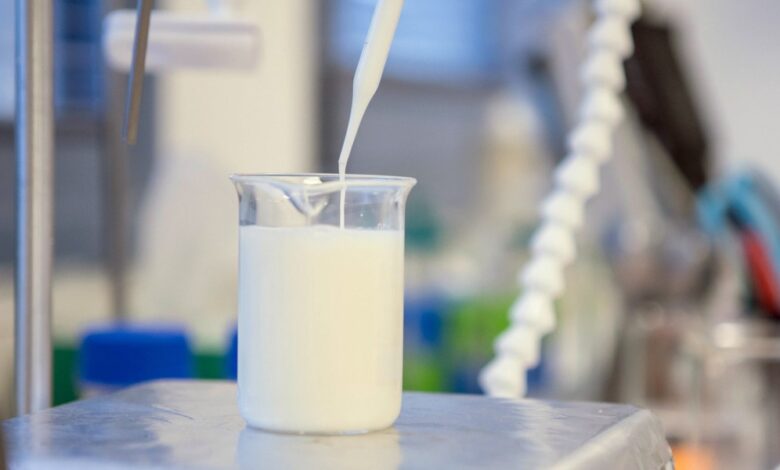The Download: milk beyond cows, and geoengineering’s funding boom

Plus: The US Supreme Court has upheld access to abortion pills
This is today’s edition of The Download, our weekday newsletter that provides a daily dose of what’s going on in the world of technology.
Biotech companies are trying to make milk without cows
The outbreak of avian influenza on US dairy farms has started to make milk seem a lot less wholesome. Milk that’s raw, or unpasteurized, can actually infect mice that drink it, and a few dairy workers have already caught the bug.
The FDA says that commercial milk is safe because it is pasteurized, killing the germs. Even so, it’s enough to make a person ponder a life beyond milk—say, taking your coffee black or maybe drinking oat milk.
But for those of us who can’t do without the real thing, it turns out some genetic engineers are working on ways to keep the milk and get rid of the cows instead. Here’s how they’re doing it.
—Antonio Regalado
This story is from The Checkup, our weekly biotech and health newsletter. Sign up to receive it in your inbox every Thursday.
This London non-profit is now one of the biggest backers of geoengineering research
A London-based nonprofit is poised to become one of the world’s largest financial backers of solar geoengineering research. It’s just one of a growing number of foundations eager to support scientists exploring whether the world could ease climate change by reflecting away more sunlight.
The uptick in funding will offer scientists in the controversial field far more support than they’ve enjoyed in the past. This will allow them to pursue a wider array of lab work, modeling, and potentially even outdoor experiments that could improve our understanding of the benefits and risks of such interventions. Read the full story.
—James Temple
How to opt out of Meta’s AI training
If you post or interact with chatbots on Facebook, Instagram, Threads, or WhatsApp, Meta can use your data to train its generative AI models beginning June 26, according to its recently updated privacy policy.
Internet data scraping is one of the biggest fights in AI right now. Tech companies argue that anything on the public internet is fair game, but they are facing a barrage of lawsuits over their data practices and copyright. It will likely take years until clear rules are in place.
In the meantime, if you’re uncomfortable with having Meta use your personal information and intellectual property to train its AI models, consider opting out. Here’s how to do it.
—Melissa Heikkila
The must-reads
I’ve combed the internet to find you today’s most fun/important/scary/fascinating stories about technology.
1 The US Supreme Court has upheld access to the abortion pill
It’s the most significant ruling since it overturned Roe v Wade in 2022. (FT $)
+ The decision represents the aversion of a major crisis for reproductive health. (Wired $)
+ But states like Kansas are likely to draw out legal arguments over access. (The Guardian)
2 Amazon is struggling to revamp Alexa
It’s repeatedly missed deadlines and is floundering to catch up with its rivals. (Fortune)
+ OpenAI has stolen a march on Amazon’s AI assistant ambitions. (MIT Technology Review)
3 Clearview AI has struck a deal to end a privacy class action
If your face was scraped as facial recognition data, you may be entitled to a stake in the company. (NYT $)
+ The startup doesn’t have the funds to settle the lawsuit. (Reuters)
+ It was fined millions of dollars for its practices back in 2022. (MIT Technology Review)
4 What’s next for nanotechnology
Molecular machines to kill bacteria aren’t new—but they are promising. (New Yorker $)
5 The Pope is a surprisingly influential voice in the AI safety debate
Pope Francis will address G7 leaders who have gathered today to discuss AI regulation. (WP $)
+ Smaller startups are lobbying to be acquired by bigger fish. (Bloomberg $)
+ What’s next for AI regulation in 2024? (MIT Technology Review)
6 Keeping data centers cool uses colossal amounts of power
Dunking servers in oil could be a far more environmentally-friendly method. (IEEE Spectrum)
7 UK voters can back an AI-generated candidate in next month’s election
How very Black Mirror. (NBC News)
8 How to tell if your boss is spying on you
Checking your browser extensions is a good place to start. (WP $)
9 We don’t know much about how the human body reacts to space
But with the rise of space tourism, scientists are hoping to find out. (TechCrunch)
+ This startup wants to find out if humans can have babies in space. (MIT Technology Review)
10 This platform is a who’s-who of rising internet stars
Famous Birthdays is basically a directory of hugely successful teenagers you’ve never heard of. (Economist $)
Quote of the day
“If it’s somebody on the right, I reward them. If it’s somebody on the left, I punish them.”
—Christopher Blair, a self-confessed liberal troll social justice warrior, explains the methods he uses to spread fake news on Facebook to the New York Times.
The big story
The quest to build wildfire-resistant homes
With each devastating wildfire in the US West, officials consider new methods or regulations that might save homes or lives the next time.
In the parts of California where the hillsides meet human development, and where the state has suffered recurring seasonal fire tragedies, that search for new means of survival has especially high stakes.
Many of these methods are low cost and low tech, but no less truly innovative. In fact, the hardest part to tackle may not be materials engineering, but social change. Read the full story.


